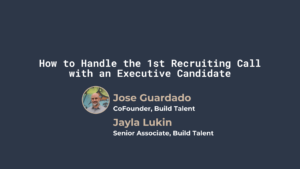By: Jose Guardado & Jayla Lukin
There are many ways to add risk to a recruiting process. Some are unforeseeable and others are “unforced errors:” preventable, self-inflicted wounds that founders make against themselves. In particular, one has shown up repeatedly: asking direct reports to interview their potential new leader. We’ve seen a few flavors of this and generally disagree with the approach. While sometimes founders have no other choice, we’ll cover the pros and cons of this method and why we advise against it.
The truth is that many times early-stage companies don’t have anyone else to use as an interviewer, so they go to the team, which is understandable. Other times Founders don’t want their teams to feel excluded/overlooked, so they bring them into the interview loop as a gesture of inclusivity. This is a slippery slope. We’ve heard the argument that team members can effectively conduct technical portions of the assessment. These are all reasonable positions, but we feel none of them outweigh the risks when choosing this strategy.
The Pro Case
- Including direct reports in an executive interview process will generate positive energy amongst the team; it’s empowering.
- This front-row seat gives junior people the chance to develop their own interviewing chops and a good view of leaders at the next level.
- Within engineering, individual contributors are often the most familiar with the code base, which can mean good intuition on assessing technical abilities.
- Often these technical contributors are in the best position to conduct a technical evaluation.
- On the candidate’s side, they get to meet the people they’d be leading.
- For the Founder, they get to showcase the current team’s talent, which can help to inspire confidence in the candidate.
Now for the downsides:
- In comparison to other startups, having direct reports on the panel can look like you don’t have your own house in order. Many executive candidates will be accustomed to interviewing with a slate of senior cross-functional leaders. This absence in your process can make your company look incomplete and immature.
- Being the first exec to join a company is riskier than being the 5th.
- Then there is the question of handling tough conversations with staff. Every company must reduce interview panels to a manageable slate (no candidate wants to sit through 20+ interview conversations). Having the reports in the interview can signal that you haven’t walked through this idea-maze and can land as another signal of inexperience/immaturity.
- Somewhat predictably, ICs often interview others like ICs. This can take the interview process into tactical or suboptimal threads that can imply to an executive that you aren’t aware of what to evaluate. Imagine a senior engineer grilling a CTO on data structures or a Controller asking a CFO to reconcile receipts. These efforts might succeed in “stumping” the candidate, but they aren’t getting any signal on what this person is like as a leader. Worse, they can hurt your chances of recruiting the candidate.
- People interviewing their potential boss can be awkward. Without guidance, many aren’t sure what to ask or what to look for. What’s the appropriate ratio of questions asked to questions answered? How much candor should they provide when discussing challenges? Getting these wrong is easy for someone with little to no experience.
- People have insecurities that can lead to a bad candidate experience. If an interviewer is disengaged or unsold on the need to hire, resentment can leak out in conversations. A direct report may feel as though they’re losing autonomy. Or that they deserve the job instead. Maybe they’ve had a bad boss before and want to anti-pattern-match against that type. Any of these can damage the relationship with the candidate.
- Finally, engineering ICs tend to be more hands-on than the leader they’re interviewing. We’ve seen people use the interview to prove this to the candidate which can be a turnoff for the opportunity altogether.
If you must use your team in the interview, make sure you can trust them to assess objectively. If you aren’t sure about this, give clear and narrow guidelines on where to focus and what to avoid. It’ll probably take a few rounds for team members to get comfortable, and several more to become adept. You can calibrate these interviews with people in your network.
There are alternatives!
You can include direct reports without having them actually conduct the interview(s): social events, happy hours, or a team lunch can offer a preview. Hosting an AMA or allowing the team to see the final presentation can also help them feel looped in. We’ve also seen founders schedule 1:1 conversations for team members under the premise of a “meet and greet”, as opposed to a full evaluation.
The final decision
Ultimately the final decision of who’s on the interview panel is up to the Founder and leadership team. The goal is to assess for the best alignment to your opportunity, present well to the candidate and allow the team to feel included, however this looks for your startup.
Authors:
Jose Guardado is the CoFounder of Build Talent a company focused on retained search of technology leadership for high growth companies. Previously, he was a Talent Manager at Y Combinator and a Partner at Andreessen-Horowitz focused on executive talent. Prior, he led recruiting for Dropcam (acq. Nest/Google) Edmodo (acq. Netdragon) and Nebula (now part of Oracle).
Jayla Lukin is a Senior Associate at Build Talent




